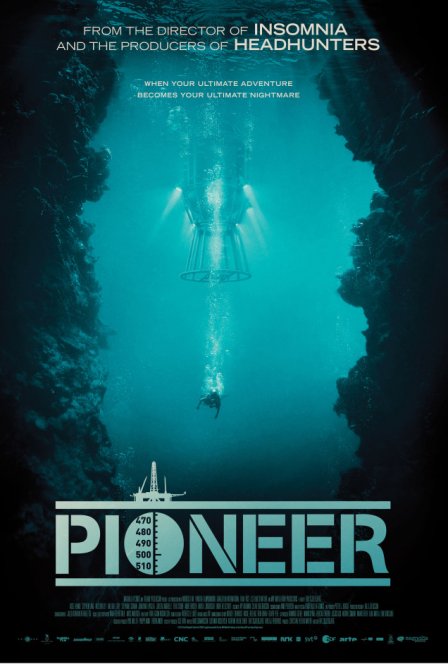Although set in the early 1980s, Erik Skjoldbjærg’s Pioneer opens with a series of title cards that explain the historical circumstances around the discovery of North Sea oil in the 1970s. The invocation of this earlier decade offers a cinematic cue that situates the film’s referential framework within the political conspiracy thrillers of that time period. Stylistically, Skjoldbjærg’s direction pays homage to notable American films such as Francis Coppola’s The Conversation or Alan J. Pakula’s paranoia trilogy. At the same time, the film also deals with the limits of human endurance and accomplishment. The conspiracy at its center involves the divers tasked with building the pipeline for all those oil reserves; to do so, they must work at a record-setting depth. When a fatal accident occurs on the first attempt, Petter (Aksle Hennie), the diver responsible, attempts to investigate what went wrong, which points him in the direction of a cover-up. Yet the film never really finds a way to reconcile its two thematic movements.
By now, the tropes of conspiracy films have become so familiar that they often veer into self-parody. If there’s an important meeting with a key informant, odds are pretty good that said informant is already dead. If there’s another car on an otherwise empty road… well, like I said, these tropes are fairly ingrained at this point, almost to the point that it would be truly surprising if that ominous car were just a family on vacation. The notion that individual actors, whether a large American petro-corporation or the Norwegian government, might go to great lengths, endangering lives or just outright ending them, has more or less become blasé. Money and power corrupt. What else is new? The film doesn’t really try to explore the larger moral or ethical implications; a shot of Petter playing with his nephew in a newly-finished indoor swimming pool while an oil rig looms behind them in the window suggests that the trade-off for bourgeois affluence is accepting corruption. If so, why then does Petter, serving as the Norwegian everyman, choose to tolerate after all that he has endured and witnessed?
The film, after all, opens with Petter undergoing a literal test of endurance, as he and the other divers sit in a hyperbaric chamber while oil company scientists increase the pressure. At one point, the effects cause them to hallucinate, imagining an albatross in there with them. This dreamlike, almost psychedelic style continues when the divers embark on the dive, their diving bell gliding down the nighttime water illuminated by an electric blue glow. Skjoldbjærg’s forays into a kind of underwater surrealism show a glimpse of what he is capable of as a director. Had he found a way to transpose these aspects of the film onto the dry land of the conspiracy, he could have crafted an intriguing meditation on the nature of paranoia, the influence of power, and their combined effect on the human spirit. Instead, he settles for a by-the-numbers (mildly) political thriller.

